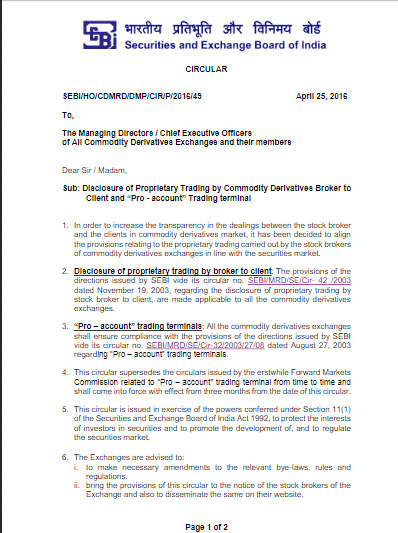The regular brokerage market is already overcrowded and most brokers offer discounts and incentives to investors and traders who play the market regularly.
In the middle of this, came online discount firms that charged an insanely low brokerage per trade and their entry further tightened the noose around the necks of the regular brokers.
The regular brokerages started focusing on PMS, AMC, Insurance and other avenues to offset their brokerage losses as online discount brokerages started eating into their revenues.
Some started trading on their own. And it’s called Proprietary Trading.
And that’s the hitch.
What is Proprietary Trading?
If a brokerage is indulging in proprietary trading it means that it is of buying and selling securities on its own account.
Brokerages employ professional traders and own own automated algorithm based tools to trade the market and have far higher chances of making a profit than any retail investor.
So, on the face of it, there’s nothing wrong with proprietary trading EXCEPT when…
…the brokerage falls short of funds/margins and decides to meet the shortfall with clients’ stocks and balances to tide over their temporary financial difficulty.
This is when trouble starts.
According to SEBI, about 450 brokerages shut shop in 2013-14.
In 2017, 12 brokerages shut down and some defaulted to their clients.
The firms that defaulted to their clients operated “prop books,” which is another term for proprietary trading.
The Risks of Proprietary Trading
You’ve read above that many brokerages have closed down and a few had defaulted to their clients, and that it is a no-brainer that you must be careful no matter how big your broker is.
Bigger may not mean better especially if the broker operates a proprietary trading desk. Brokers use algorithmic trading, insider information, trading strategies, etc., to enter into trades and make profits.
Now, in this choppy and disruptive financial markets, anything can go wrong and in an instant and the broker may end up losing 100s of crores in a matter of minutes despite adopting adequate risk management processes.
Consider two facts:
- About 20% of the cash turnover on BSE and NSE is made up of proprietary trading.
- About 40% of commodity trading is from proprietary trading.
Considering that the daily turnover for cash and FNO on both exchanges is about 6,00,000 to 8,00,000 crores, it is easy to understand that brokers operating proprietary desks face considerable risk from market fluctuations.
How To Eliminate Risks of Proprietary Trading
There are two things you should do:
- Ask your broker if he operates a proprietary trading desk. Actually he is supposed to make that disclosure, as per SEBI rules. If he does operate one, move on (especially if he is an online discount broker) and look for another broker. If he doesn’t makee the disclosure, show him this circular:

- If you still want to open an account with him, read through the Power of Attorney (POA) carefully, and don’t skip the fine print. If you feel that the POA will allow the broker play around with your cash and stocks in his proprietary trading, don’t open an account with him. Also know that SEBI is putting in place a mechanism that will stoop misuse of POAs, but these rules are yet to be announced.
This is what you must know about proprietary trading. Don’t compromise no matter how big the broker is – he doesn’t matter, your money does.


Sir,
Good informative blog…
Can you help me to get information if ZERODHA uses like prop books?
Call and check. I think it does.
Thanks for info. I am having a/c with Zerodha & Aditya Birla, are they ok . pl. guide
You should call and check. The brokerage has to disclose.
One more great help from Sunil ji….
Thank You Sir.
Sir,
Which brokerage are you using??Any recommendations from your side??
Very Informative .Do you think its safe to have account with these guys ( like Zerodha ) for long term investment portfolio or should one keep Investment portfolio with only top guys like ICICIDIRECT.
Very informative blog.l didn’t think of this risk.considered very these guys r honest.thank u Sunil ji
THANK YOU SIRJI FOR UR REPONSE…